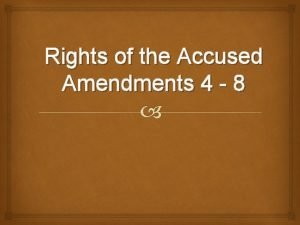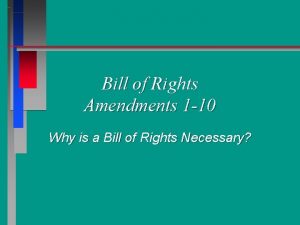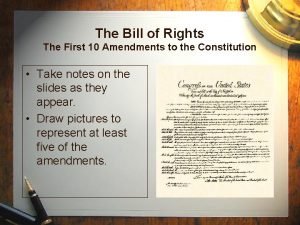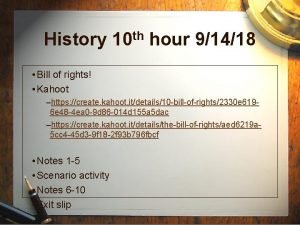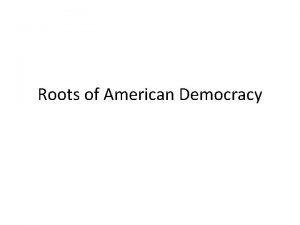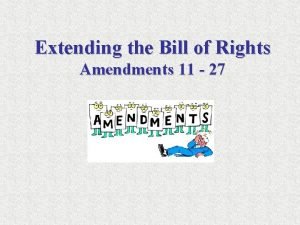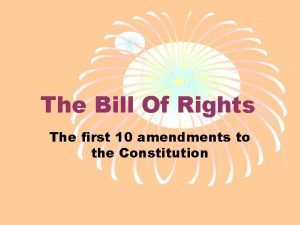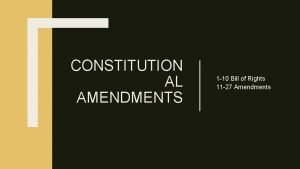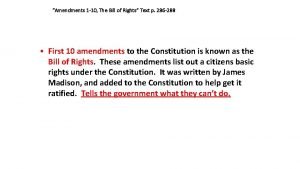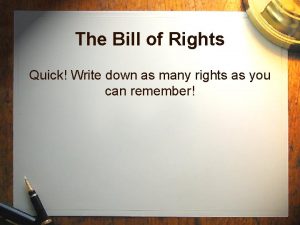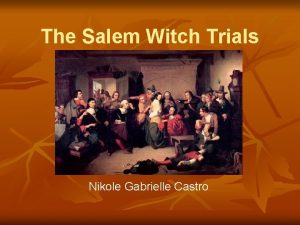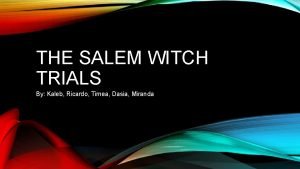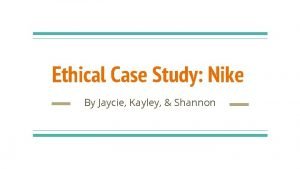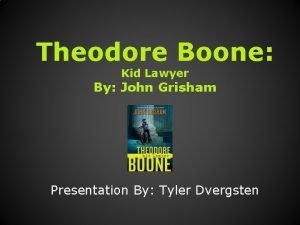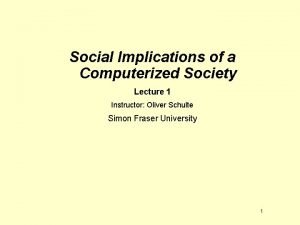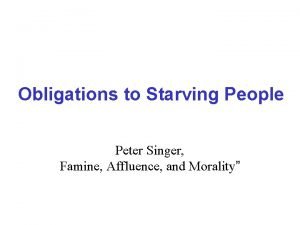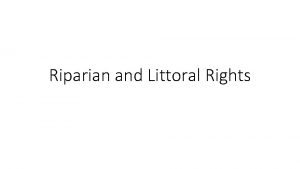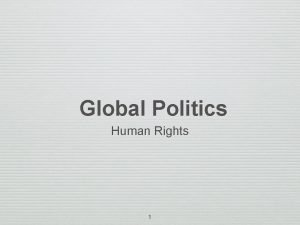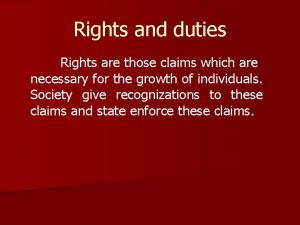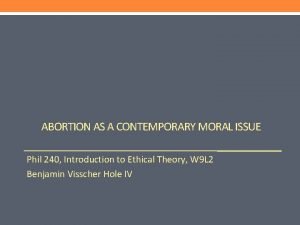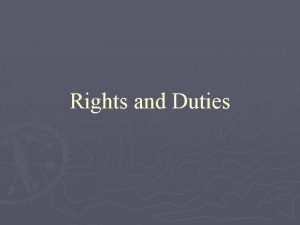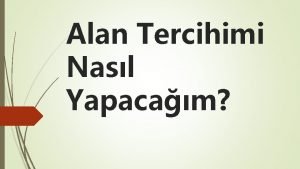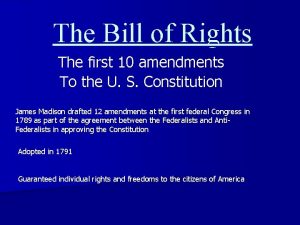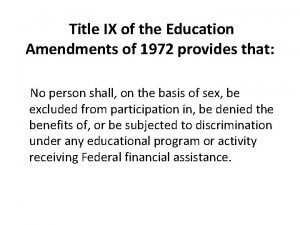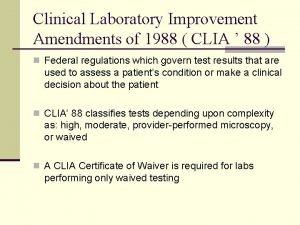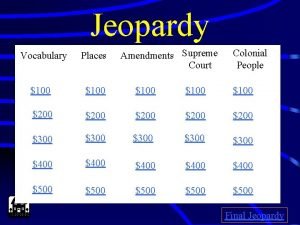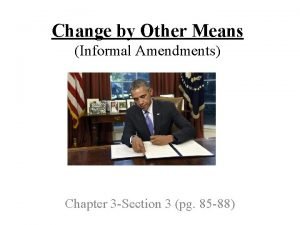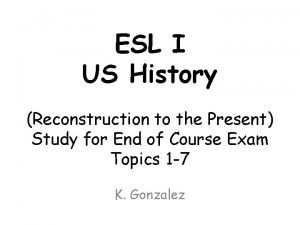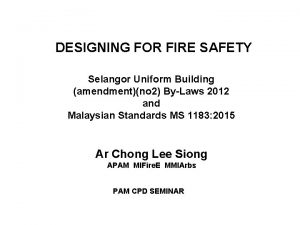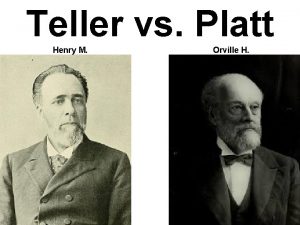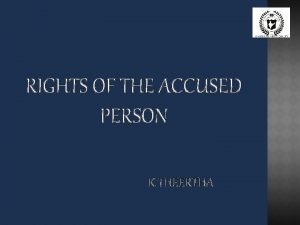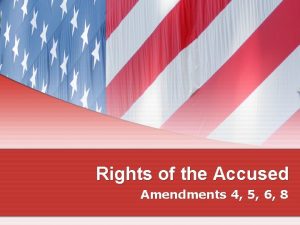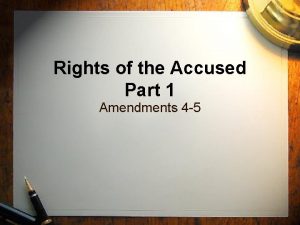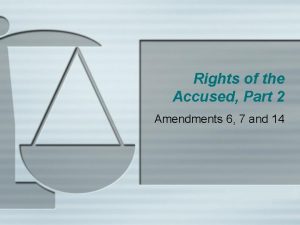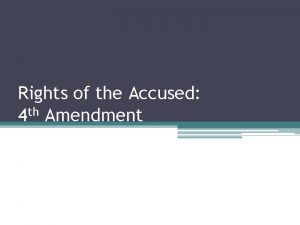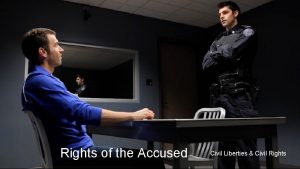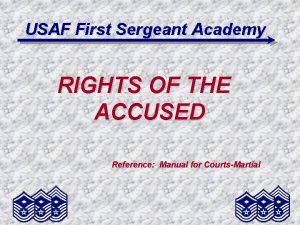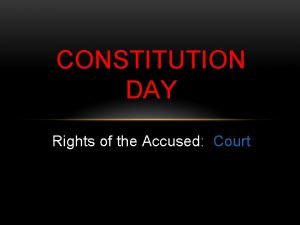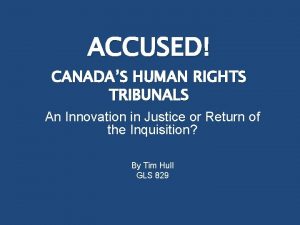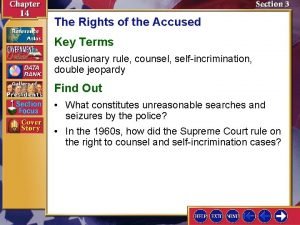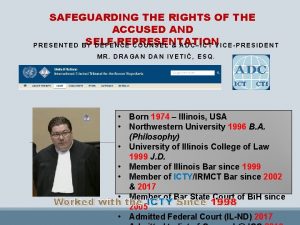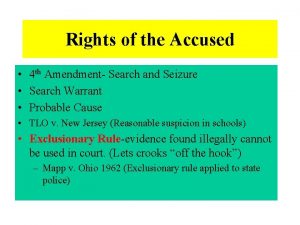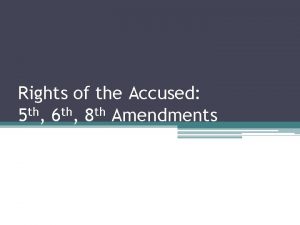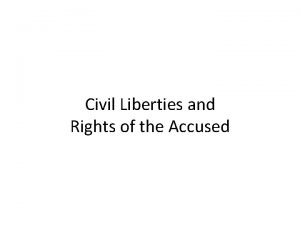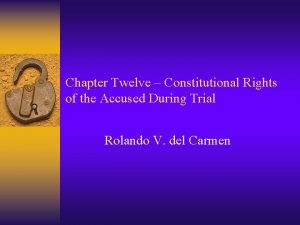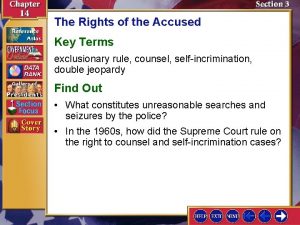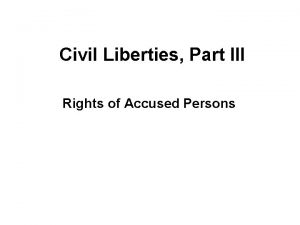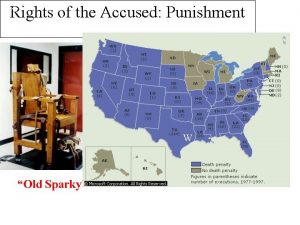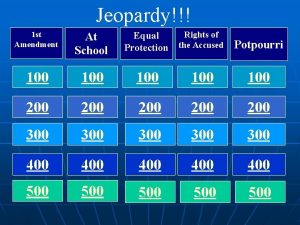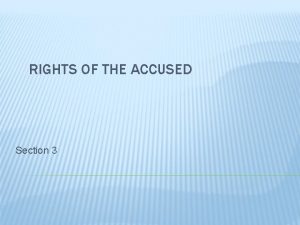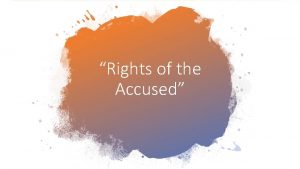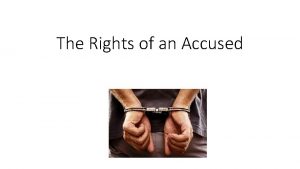Rights of the Accused Amendments 4 8 http



































- Slides: 35

Rights of the Accused Amendments 4 - 8

http: //www. youtube. com/watch? v=kmbpyer. Uxe 4

Due Process: In whatever the government does, the government must act fairly and in accordance with established rules. They can’t act unfairly, arbitrarily, or unreasonably 5 th Amendment: The Federal Government can’t deprive anyone of life, liberty, or property without due process 14 th Amendment: The State and Local Governments can’t deprive anyone of life, liberty, or property without due process. http: //www. baltimoresun. com/sports/ravensinsider/bal-lawyer-david-cornwell-discusses-dueprocess-issues-for-ray-rice-following-indefinitesuspension-20140916, 0, 1389093. story? track=rss

Two Kind of Due Process Substantive: the laws (policies) must be fair Regents of UCLA v Bakke – reverse discrimination

Two Kinds of Due Process Procedural – procedures, methods of government must be fair

Roe V Wade (1973) Facts: Roe (P), a pregnant single woman, brought a class action suit challenging the constitutionality of the Texas abortion laws. These laws made it a crime to obtain or attempt an abortion except on medical advice to save the life of the mother. Who won? Roe Type of Due Process violated? Procedural Why? The Due Process Clause protects the right to privacy, including a woman’s right to terminate her pregnancy, against state action. http: //www. history. com/topics/earlwarren/speeches/roe-v-wade-decision-announced

Rochin V California (1952) Facts: Rochin swallowed drug capsules to dispose of evidence. The police pummeled him and jumped on his stomach in a vain effort to make him throw up. They took him to a hospital where a doctor was instructed by the police officers to administer an emetic by forcibly passing a tube into Rochin's stomach. He vomited the capsules and was convicted on the basis of the evidence produced from his vomit. Question: Did the police procedure forcing Rochin to vomit violate the Fifth Amendment privilege against self-incrimination and the Due Process Clause of the 14 th Amendment? Due Process violated? Procedural Why? The Court reversed the conviction. The police violated Rochin's right to due process of law. Due process was an admittedly vague concept, but it prohibited "conduct that shocks the conscience. "

Goss v Lopez Facts: Nine students at two high schools and one junior high school in Columbus, Ohio, were given 10 -day suspensions from school. The school principals did not hold hearings for the affected students before ordering the suspensions, and Ohio law did not require them to do so. The principals' actions were challenged, and a federal court found that the students' rights had been violated. The case was then appealed to the Supreme Court. Question: Did the imposition of the suspensions without preliminary hearings violate the students' Due Process rights guaranteed by the Fourteenth Amendment? Ruling: Yes. In a 5 -to-4 decision, the Court held that because Ohio had chosen to extend the right to an education to its citizens, it could not withdraw that right "on grounds of misconduct absent fundamentally fair procedures to determine whether the misconduct ha[d] occurred. " The Court held that Ohio was constrained to recognize students' entitlements to education as property interests protected by the Due Process Clause that could not be taken away without minimum procedures required by the Clause.

Fourth Amendment “The right of the people to be secure in their persons, houses, papers, and effects, against unreasonable searches and seizures, shall not be violated; and no warrants shall issue, but upon probable cause, supported by oath or affirmation, and particularly describing the place to be searched, and the persons or things to be seized” http: //www. youtube. com/watch? v=jr. Cb. HYggdf. Y

Fourth amendment What two things does the 4 th Amendment protect? People/person Possessions Designed to prevent blanket search warrants. Police officers must have a proper warrant obtained with probable cause, or “reasonable grounds”.

Fourth amendment Can a search be made without a warrant? Yes. . . Police do not need a warrant if evidence is “in plain view”. EX: If the police go to your front door and they are able to see several weapons and drugs inside your house, they do not need a warrant to search your home.

Fourth amendment When officers make an arrest, they do not need a warrant to search “the area within which he might gain possession of a weapon or destructible evidence”. Most arrests take place WITHOUT a warrant. Police can arrest a person in a public place without a warrant if there is probable cause that the person has committed/might commit a crime.

Automobiles and the 4 th amendment An officer needs no search warrant to search a car, boat, airplane, or any other vehicle when there is probable cause to believe that it is involved in illegal activities. Whenever police lawfully stop a car, they do not need a warrant to search anything in that vehicle that they have reason to believe holds evidence of a crime.

Exclusionary rule Exclusionary Rule: Evidence gained as the result of an illegal act by police cannot be used against the person from whom it was seized. Mapp v. Ohio, 1961 Facts: Dollree Mapp was convicted of possessing obscene materials after an admittedly illegal police search of her home for a fugitive. She appealed her conviction on the basis of freedom of expression. Question: Were the confiscated materials protected by the First Amendment? (May evidence obtained through a search in violation of the Fourth Amendment be admitted in a state criminal proceeding? ) The Court brushed aside the First Amendment issue and declared that "all evidence obtained by searches and seizures in violation of the Constitution is, by [the Fourth Amendment], inadmissible in a state court. " Mapp had been convicted on the basis of illegally obtained evidence. This was an historic -- and controversial -- decision. It placed the requirement of excluding illegally obtained evidence from court at all levels of the government.

Wiretapping and the 4 th amendment Katz v. United States, 1967 “What a person knowingly exposes to the public, even in his own home or office, is not a subject of 4 th Amendment protection…But what he seeks to preserve as private, even in an area accessible to the public, may be constitutionally protected”. Police must have a proper warrant before installing listening devices.

New Jersey V T. L. O Background: In a New Jersey high school, a teacher found two girls smoking in the bathroom and took them to the principal's office. One girl admitted to smoking but the other, known as T. L. O. , denied it. The principal demanded to see the girl's purse and found evidence that she was also selling marijuana at school. T. L. O. was taken to the police station where she admitted to selling marijuana. Based on her confession and the evidence in her purse, the state of New Jersey brought charges against her. In a juvenile court, T. L. O. argued that her Fourth Amendment rights against unreasonable searches and seizures had been violated. The court sided with the school, and T. L. O. took her case to the New Jersey Supreme Court, which later found that the search was unreasonable and the evidence could not be used. The state of New Jersey appealed the decision to the United States Supreme Court. Decision: In 1985, the Supreme Court, by a 6 -3 margin, ruled that New Jersey and the school had met a "reasonableness" standard for conducting such searches at school. The high court said school administrators don't need to have a search warrant or probable cause before conducting a search because students have a reduced expectation of privacy when in school. REASONABLE SUSPICION rather than probable cause

Fifth Amendment: “No person shall be held to answer for any capital, or otherwise infamous crime, unless on a presentment or indictment of a Grand Jury, except in cases arising in the land or naval forces, or in the Militia, when in actual services in time of war or public danger; nor shall any person be subject for the same offence to be twice put in jeopardy of life or limb; nor shall be compelled in any criminal case to be a witness against himself, nor be deprived of life, liberty, or property, without due process of law; nor shall private property be taken for public use, without just compensation. ”

What does innocent until proven guilty mean? The 5 th Amendment protects people who have been accused of a crime. Capital Crime: crimes that you could be put to death for Once a capital crime has been committed, the evidence is sent to a grand jury. The grand jury will determine if there is enough evidence for a trial. Menendez brothers http: //espn. go. com/video/clip? id=espn: 11538772 Indictment – formal statement of charges

Fifth Amendment You cannot be tried for the same crime twice—called “Double Jeopardy” Exceptions: Appeal – Picking Cotton Civil or Criminal Court – OJ State and Federal Court – drugs, kidnapping, and killing in different state You do not have to testify against your self. “I plead the fifth”http: //www. youtube. com/watch? v=Ko 2 bg. DNZ 9 q 4 You must have due process of law before you are convicted The government cannot take your land unless it pays – Eminent Domain

Sixth Amendment “In all criminal prosecutions, the accused shall enjoy the right to a speedy and public trial, by an impartial jury of the State and district where in the crime shall have been committed, which district shall have been previously ascertained by law, and to be informed of the nature and cause of the accusation; to be confronted with the witnesses against him; to have compulsory process for obtaining witnesses in his favor, and to have the assistance of counsel for his defense. ”

Speedy and Public Trial How many days can you be held before you see a judge? Is there a time restriction for how long a trial can last? Can the media enter the courtroom to cover your trial? Who decides if they can enter?

Impartial Jury: jury of people who are not involved with the case, and who are not biased against them. How do the courts get a list of potential jurors? Registered Voters

You must be told the nature of your charges…. You must be told what you are being charged with. Must receive a copy of the charges. Must be able to see and hear the witnesses as they testify against you. What is it called when an officer arrests you and takes you to jail, but you are never told the reason for your arrest? Denied Habeas Corpus

You must be confronted with witnesses/Compulsory process for obtaining witnesses How can a witness be required to appear in court? Subpoena What happens if a witness does not show up? Jail

Right to Counsel What is counsel? Attorney/lawyer

Gideon v. Wainwright Facts: Clarence Earl Gideon was charged in Florida state court with a felony: having broken into and entered a poolroom with the intent to commit a misdemeanor offense. When he appeared in court without a lawyer, Gideon requested that the court appoint one for him. According to Florida state law, however, an attorney may only be appointed to an indigent defendant in capital cases, so the trial court did not appoint one. Gideon represented himself in trial. He was found guilty and sentenced to five years in prison. Gideon filed a habeas corpus petition in the Florida Supreme Court and argued that the trial court’s decision violated his constitutional right to be represented by counsel. The Florida Supreme Court denied habeas corpus relief. Question: Does the Sixth Amendment's right to counsel in criminal cases extend to felony defendants in state courts? Decision: Yes. Justice Hugo L. Black delivered the opinion of the 9 -0 majority. The Supreme Court held that the framers of the Constitution placed a high value on the right of the accused to have the means to put up a proper defense, and the state as well as federal courts must respect that right. The Court held that it was consistent with the Constitution to require state courts to appoint attorneys for defendants who could not afford to retain counsel on their own. http: //www. cbsnews. com/videos/the-right-to-have-an-attorney/

Escobedo v. Illinois Facts: Danny Escobedo was arrested and taken to a police station for questioning. Over several hours, the police refused his repeated requests to see his lawyer. Escobedo's lawyer sought unsuccessfully to consult with his client. Escobedo subsequently confessed to murder. Question: Was Escobedo denied the right to counsel as guaranteed by the Sixth Amendment? Decision: Yes. Justice Goldberg, in his majority opinion, spoke for the first time of "an absolute right to remain silent. " Escobedo had not been adequately informed of his constitutional right to remain silent rather than to be forced to incriminate himself. The case has lost authority as precedent as the arguments in police interrogation and confession cases have shifted from the Sixth Amendment to the Fifth Amendment, emphasizing whether the appropriate warnings have been given and given correctly, and whether the right to remain silent has been waived. http: //www. youtube. com/watch? v=4 t. CVn. PVqi. O 0

http: //www. youtube. com/watch? v=f. Rz. PJu. Sffo 0

Miranda v. Arizona In Miranda v. Arizona (1966), the Supreme Court ruled that detained criminal suspects, prior to police questioning, must be informed of their constitutional right to an attorney and against self-incrimination. The case began with the 1963 arrest of Phoenix resident Ernesto Miranda, who was charged with rape, kidnapping, and robbery. Miranda was not informed of his rights prior to the police interrogation. During the twohour interrogation, Miranda allegedly confessed to committing the crimes, which the police apparently recorded. Miranda, who had not finished ninth grade and had a history of mental instability, had no counsel present. At trial, the prosecution's case consisted solely of his confession. Miranda was convicted of both rape and kidnapping and sentenced to 20 to 30 years in prison. He appealed to the Arizona Supreme Court, claiming that the police had unconstitutionally obtained his confession. The court disagreed, however, and upheld the conviction. Miranda appealed to the U. S. Supreme Court, which reviewed the case in 1966. The Supreme Court, in a 5 -4 decision written by Chief Justice Earl Warren, ruled that the prosecution could not introduce Miranda's confession as evidence in a criminal trial because the police had failed to first inform Miranda of his right to an attorney and against self-incrimination. The police duty to give these warnings is compelled by the Constitution's Fifth Amendment, which gives a criminal suspect the right to refuse "to be a witness against himself, " and Sixth Amendment, which guarantees criminal defendants the right to an attorney. http: //www. youtube. com/watch? v=dhxwrhyuc. TM

Seventh Amendment “In suits of common law, where the value of controversy shall exceed twenty dollars, the right of trial by jury shall be preserved, and no fact tried by a jury, shall be otherwise reexamined in any court of the United States, than according to the rules of the common law. ” Civil Trial by Jury

Seventh Amendment If a case involves an amount of $20 or more, the defendant has the right to have a trial by jury.

Eighth Amendment No excessive bail No cruel and unusual punishment

8 th Amendment “Excessive bail shall not be required, nor excessive fines imposed, nor cruel and unusual punishments inflicted. ” No Excessive Bail/Fines No Cruel and Unusual Punishment

9 th Amendment “The enumeration in the Constitution, of certain rights, shall not be construed to deny or disparage others retained by the people. ” Protection of Rights Not Specifically Given in the Bill of Rights

th 10 Amendment “The powers not delegated to the United States by the Constitution, nor prohibited by it to the states, are reserved to the states respectively, or to the people. ” Powers of the States and People
 Rights of the accused amendments 4-8
Rights of the accused amendments 4-8 Amendments 1-10
Amendments 1-10 What are individual rights
What are individual rights 9th amendment simplified
9th amendment simplified 10 amendments bill of rights
10 amendments bill of rights Bill of rights amendments 11 27
Bill of rights amendments 11 27 Bill of rights 10 amendments
Bill of rights 10 amendments Bill of rights 10 amendments
Bill of rights 10 amendments Amendments 1-10
Amendments 1-10 Bill of rights 10 amendments
Bill of rights 10 amendments What options did an accused witch have in salem
What options did an accused witch have in salem What sort of evidence was used to arrest accused witches
What sort of evidence was used to arrest accused witches Kayley ray
Kayley ray The lost leader meter
The lost leader meter John proctor criticizes reverend parris for:
John proctor criticizes reverend parris for: Theodore boone kid lawyer characters
Theodore boone kid lawyer characters How does creon react to the accused charges against him?
How does creon react to the accused charges against him? Negative rights vs positive rights
Negative rights vs positive rights Negative rights
Negative rights Riparian or littoral rights
Riparian or littoral rights Positive vs negative rights
Positive vs negative rights Legal rights and moral rights
Legal rights and moral rights Positive vs negative rights
Positive vs negative rights Legal rights vs moral rights
Legal rights vs moral rights Positive rights and negative rights
Positive rights and negative rights Http //mbs.meb.gov.tr/ http //www.alantercihleri.com
Http //mbs.meb.gov.tr/ http //www.alantercihleri.com Http //pelatihan tik.ung.ac.id
Http //pelatihan tik.ung.ac.id Formal and informal amendments
Formal and informal amendments First 10 amendments
First 10 amendments Title ix of the education amendments act of 1972 prohibits
Title ix of the education amendments act of 1972 prohibits What are the two patient identifiers
What are the two patient identifiers Amendments
Amendments Change by other means
Change by other means Reconstruction amendments
Reconstruction amendments Uniform building by-law malaysia latest
Uniform building by-law malaysia latest Teller amendment and platt amendment
Teller amendment and platt amendment
